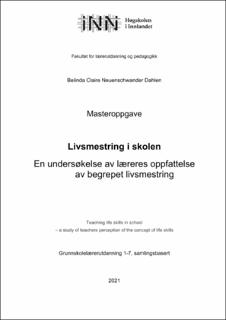| dc.contributor.advisor | | |
| dc.contributor.author | Dahlen, Belinda Claire Neuenschwander | |
| dc.date.accessioned | 2023-04-24T16:11:31Z | |
| dc.date.available | 2023-04-24T16:11:31Z | |
| dc.date.issued | 2022 | |
| dc.identifier | no.inn:inspera:109713146:32195931 | |
| dc.identifier.uri | https://hdl.handle.net/11250/3064636 | |
| dc.description.abstract | Høsten 2020 ble det innført nytt læreplanverk for den norske grunnskolen, gjennom fagfornyelsen. Her blir det introdusert tre nye tverrfaglige temaer, inkludert temaet folkehelse og livsmestring. Det forsterkede søkelyset som er satt på livsmestring i skolen vekker derfor spørsmål om hva som innrammes i dette begrepet, og hva lærerens rolle er i arbeidet med å implementere det i skolen. Formålet med dette forskningsprosjektet har derfor vært å utforske lærerens oppfattelse og opplevelse av begrepet livsmestring. Det har blitt gjort ved å rette oppmerksomheten på hvordan lærerens forståelse møter intensjonene som formuleres i styringsdokumentene, og videre se på hvordan deres helhetlige oppfatning av begrepet setter rammene for deres arbeid og anvendelse av temaet. Med dette som grunnlag er problemstillingen for prosjektet utformet som følger:
Hvordan oppfattes begrepet livsmestring, og hvilke føringer legger dette for lærerens praktiske arbeid med temaet?
Det er formulert fire forskningsspørsmål som hjelper å trekke frem viktige elementer i forhold til hva problemstillingen spør etter.
1. Hva er lærerens egne forståelse av begrepet livsmestring?
2. Hvordan oppfatter læreren begrepet livsmestring i styringsdokumentene?
3. Hvordan oppfatter læreren skolen som arena for livsmestring?
4. Hvordan implementerer læreren livsmestring i sin planlegging og gjennomføring av skolehverdagen?
Dette er en kvalitativ studie, der det er blitt gjennomført tre individuelle intervjuer med lærere på mellomtrinnet. Datamaterialet har blitt analysert gjennom en tematisk analyse, og blitt drøftet med vekt på den teoretiske forankringen for prosjektet, som består av generell teori om relasjoner, Honneth sin anerkjennelsesteori, Bandura sine teorier of «human agency» og «self-efficacy» og teori rettet mot utviklingen av god psykisk helse.
Funnene som presenteres viser at det er enighet hos lærerne at livsmestring har en viktig del i skoledagen, men det er fortsatt mye usikkerhet rundt temaet bør få plass i deres planlegging og gjennomføring av undervisningen. Lærerne viser til et overordnet mål om at elevene deres skal utvikle evner for å takle utfordringer og motgang, og fungere som medmennesker og gode samfunnsborgere. Relasjon, mestring, motivasjon, støtte og elevenes sosiale og emosjonelle utvikling, er etter lærerens mening verdifulle bidrag til elevenes livsmestring. | |
| dc.description.abstract | In the autumn of 2020, a new teaching curriculum for the Norwegian primary and lower secondary school was introduced, through the subject renewal. Here, three new interdisciplinary themes are introduced, including the theme og public health and life skills. The intensified spotlight that has been placed on life skills in schools raises the question about what this concept includes, and what is the teacher’s role in implementing it into the education system. The purpose of this research project has therefore been to explore the teacher’s perception and experience of the concept of life skills. This has been done by drawing attention to how the teacher’s understanding meets the intentions formulated in the governing documents, and further looking at how their total perception of the concept develops a guideline for their application of the theme life skills into their work. With this as a basis, the thesis question for the research project is as follows:
How is the concept of life skills perceived, and what guidelines does this provide for the teacher’s practical work with the topic?
Four research questions have been formulated to help highlight the important elements in relation to the thesis question.
1. What is the teacher’s own understanding of the concept of life skills?
2. How does the teacher perceive the concept of life skills through the governing documents?
3. How does the teacher perceive the school as an arena for life skills?
4. How does the teacher apply life skills into their planning and execution in everyday schooling?
This is a qualitative study, where three individual interviews have been conducted with teachers who teach at the upper primary level. The data has been analyzed by use of thematic analysis and has been discussed with emphasis om the theoretical foundation set for the project. This consists of general theory of interactive relationships, Honneth’s theory of recognition, Bandura’s theories of “human agency” and “self-efficacy”, and theory oriented towards the development of good mental health.
The findings presented, show that there is a consensus among teachers that life skills have an important part to play in schools, but there is still a lot of uncertainty about the concept “life skills” and how it should be included in their planning and teaching. The teachers refer to the main goal, that is for their pupils to develop abilities to cope with challenges and adversity, and function as supportive human beings and good citizens. Social relationships, achievement, motivation, support and the pupils social- and emotional development are, according to the teachers, valuable contributions to the pupil’s life skills. | |
| dc.language | nob | |
| dc.publisher | Inland Norway University | |
| dc.title | Livsmestring i skolen - En undersøkelse av læreres oppfattelse av begrepet livsmestring | |
| dc.type | Master thesis | |
